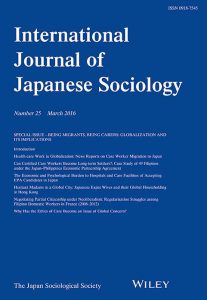Approaching normative coherence in development from different perspectives
by Sandra Häbel, RISC-RISE and Harlan Koff, University of Luxembourg · Published · Updated
 We all have certain principles, values or norms in our lives that we follow. But what about those principles in politics? Especially since the launch of the 2030 Agenda and its set of sustainable development goals (SGDs), norms should be represented in policies ranging from the global to the local. The 2030 Agenda provides normative standards for development policies as well as sectors where the Agenda might not seem relevant at first glance. One policy can have (intended or unintended) negative effects on another policy or even annul efforts to promote sustainable development.
We all have certain principles, values or norms in our lives that we follow. But what about those principles in politics? Especially since the launch of the 2030 Agenda and its set of sustainable development goals (SGDs), norms should be represented in policies ranging from the global to the local. The 2030 Agenda provides normative standards for development policies as well as sectors where the Agenda might not seem relevant at first glance. One policy can have (intended or unintended) negative effects on another policy or even annul efforts to promote sustainable development.
A popular example for extreme incoherence used to be the European Union’s development policy and its Common Agricultural Policy. On the one hand, the EU used to invest heavily in developing countries and support local food production, but on the other hand, EU overproduced goods which were exported to those countries and sold there at a price that was cheaper than local goods due to the EU’s massive agricultural subsidies. Another example used to be the EU development and fisheries policies, where development aid was meant to help local fishermen increase their catch, but simultaneously the EU had its own large fishing fleets right at those coasts. If we truly want to achieve sustainable development, these incoherences need to be addressed and we need to integrate a strong normative dimension, because without it policies risk reproducing the inequalities that have emerged from traditional development models.
We are talking here about normative coherence for development (NCD), i.e., integrating and implementing norms across various policy levels and policy domains. In our special issue, ‘Normative Coherence for Development’, we approach different regions (EU, ASEAN, Central America and African small island states) from the perspective of normative coherence for development and examine different policies at different governance levels.
We show how policies are often coherent without necessarily being normatively coherent with key principles on which the 2030 Sustainable Development Agenda is founded. So why should we even pursue sustainable development? What exactly is sustainable development? And for whom is sustainable development? The SDGs focus heavily on the latter two questions without adequately engaging with the first question which addresses the purpose of the 2030 vision. If we understand the why?, we also understand that we cannot create “better lives for all” through a fragmented and internally competing policy system. Similarly, policy coherence for development has been implemented with little attention to the normative dimension of policy, which de-prioritizes ethics and values that are fundamental foundations for transformative change. Normative coherence for development can be viewed as Policy Coherence for Development with a purpose.
The contributions engage with normative coherence for development and region-building through complementary perspectives which discuss the above-mentioned questions. The first grouping of articles engages with the nature, potential, and relevance of norms for region-building and development. Lauri Siitonen’s contribution provides a methodological framework for analysing norms in terms of content and function. He shows how norms affect European regionalism and applies his analyses to EU migration policies. Similarly, the second article by Edith Kauffer and Carmen Maganda studies the importance of global water norms in Central America. They discuss the hegemonic nature of global norms within supposedly weak regions, thus introducing an important reflection concerning the relationship between normative coherence for development and political power.
The second grouping of articles focuses on regional implementation of normative coherence for development. Alexandra Berger’s contribution examines EU migration policies and shows that they are normatively incoherent with sustainable migration management and sustainable development, because these migration policies promote non-mobility as a policy response to third-country immigration. Similarly, the article by Sandra Häbel, Harlan Koff, and Marie Adam focuses on migration within ASEAN countries. This contribution documents ASEAN’s recent legal commitments to gender equality and examines female intra-regional migration within this framework. The article shows how ASEAN undermines gender coherence for development by concentrating women’s rights and protection for female migrants in its cultural community. Economic community measures undermine gender equality by promoting growth-based strategies that exploit female migrant labour. The third article in this grouping, by Suzanne Graham and Victoria Graham, analyses the African Union’s Banjul Charter, which establishes a system of human and civil rights within the continent. This article shows that African Small Island States formally commit to the charter, but implementation varies significantly, indicating significant normative incoherence for development in practice among these states.
Finally, Vlada Perekrestova’s article engages with regional integration as a system of actors. She studies women’s empowerment in Myanmar through the establishment of social entrepreneurship organizations. She contends that networks of non-governmental actors in Asia can more effectively promote NCD than formal political bodies because they are not constrained by non-interference norms and they understand better the needs of local communities.
Normative coherence for development can be approached from different perspectives, but each of them highlight that a normative dimension is crucial in achieving sustainable development. Regions are an important interlocutor between the global, national, and sub-national level and, as such, are crucial for implementing the sustainable development agenda. However, regions alone will not be able to overcome normative incoherences – this has to happen at all governance levels and across all policy domains, even if it comes at the cost of efficiency.
Note:
The special issue ‘Normative Coherence for Development’ is published in Development Policy Review and is free to read for a limited time.
Guest editors: Sandra Häbel & Harlan Koff






1099-0860/asset/NCB_logo.gif?v=1&s=40edfd0d901b2daf894ae7a3b2371eabd628edef)
1099-1328/asset/dsa_logo.jpg?v=1&s=e4815e0ca3064f294ac2e8e6d95918f84e0888dd)